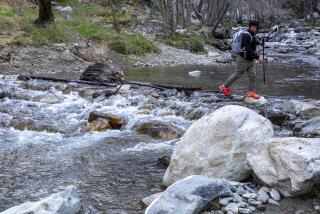Beach Aglow With Tradition
- Share via
BOLSA CHICA STATE BEACH — From Pacific Coast Highway, the fires look like the glow of a distant battlefield. Driving south from Sunset Beach you can see them on your right, bathing the night sky in an eerie orange like the far-off sentries of summer.
This place used to be called Tin Can Beach. Strewn with the refuse of the industrial age, the three-mile stretch of sand featured the kind of mess that caused mothers passing in their cars to shake their heads and admonish their children never to come here. The only people at Tin Can Beach in those days were the bums and vagabonds occupying the shabby tents and lean-tos.
Then in about 1960 the state took control, cleaned up the beach, built a parking lot and started charging entrance fees. Today Bolsa Chica State Beach is one of the most popular in the state, especially for Southern Californians eager to engage in that primordial rite of summer, the annual lighting of fires on the sand.
While some other Orange County beaches feature fire rings, local lifeguards say, this is the largest and most often used. Directly across the street from Bolsa Chica wetlands--a vast stretch of swamp and wildlife preserves providing a glimpse of what the area looked like before the Pacific Coast Highway--the beach offers a dramatic contrast between the old and the new. On one side of the road are thousands of birds, while on the other are thousands of flame-fanning beach-goers.
“There’s something medicinal about fire,” says Chris Benton, a 29-year-old electrician from Westminster, leaning against the bed of his truck on the beach side while two friends throw logs onto an already blazing bonfire. “Without driving for four hours, this is the only place you can go to almost feel human.”
Ed Cecco, 23, a maintenance worker who has been doing this regularly since childhood, agrees wholeheartedly. “It’s relaxing,” he says. “It’s kind of traditional among Californians. It’s a summer thing.”
Indeed, they come from all over as the cool nights of spring turn into the sultry evenings of summer. Pulling off Coast Highway, they line up to pay the $6 entrance fee, park and scramble for one of the long line of concrete fire rings that dot the sand.
Gathering with family or friends, they drink beer, roast marshmallows and play guitars amid the familiar pungent aroma of fire lapping at crackling wood. Occasionally a couple will steal away together for a quiet walk in the sand. Others show up in big groups bearing official affiliations with churches or schools.
On a hot summer night, according to lifeguards, as many as 20,000 revelers can be found clustered around the campfires of Bolsa Chica.
“It’s like a small city out here except that you don’t have the liquor stores,” says Mat Fuzie, a lifeguard/state park peace officer who has been patrolling the area for years.
There are, of course, certain rules that everyone must follow. Fires must be in fire rings. Except for certain designated non-alcoholic areas, drinking is allowed as long as the consumers are older than 21 and take their spirits from non-glass containers. And with the exception of one section reserved for recreational vehicles, beach-goers must be in their cars and en route home by midnight.
Like any “small city,” however, the beach has its share of problems. Criminal activities, Fuzie says, range from illegal drinking by minors to more serious crimes including an occasional rape or assault. Gang members sometimes gather to cavort at Bolsa Chica. And last summer, Fuzie said, one beach-goer was killed by a hit-and-run driver in the middle of the parking lot.
For the most part, though, the summer celebrants are a remarkably orderly lot as they blithely tend their fires. Most say they feel safe, peaceful, warm, friendly and protected.
“It’s one of my favorite beaches,” says Marlene Greenleaf, a teacher for the Fullerton School District. On this particular night she has brought 23 third- and fourth-graders to the beach, part of their study of astronomy. Between munches on marshmallows, the children gaze through telescopes at the array of brightly colored stars in the sky.
“This is fantastic,” Greenleaf says, taking in the beach with a sweep of her hand. “I did my teacher training in Illinois. It’s wonderful to be able to bring (students) to this environment.”
A few hundred yards away, Anna Perez and Mark Martinez are engaged in a private ritual of their own invention. For many years the two have been close friends, but soon Perez will be returning to Mexico, the land of her birth, and they wanted to mark the occasion. So they have come to the beach with mementos of their past--letters, photos, poems--that they intend to share before burning.
“It’s a cleansing,” explains Martinez, 37. “A milestone that the fire will etch into our memories.”
Much as summer’s arrival is etched into the memories of all who pass this way.
“It’s a great feeling,” says one who’s done that many times. “It gives off warmth and the feeling of being among friends. It makes you realize what a great life this is.”
More to Read
Sign up for Essential California
The most important California stories and recommendations in your inbox every morning.
You may occasionally receive promotional content from the Los Angeles Times.










